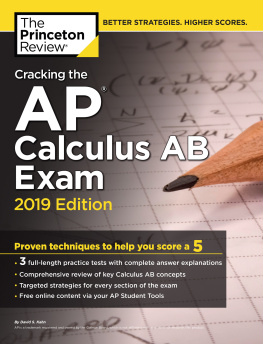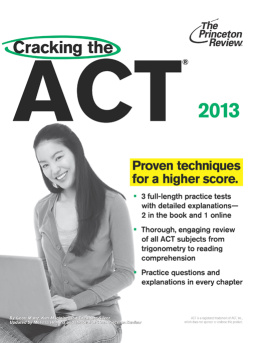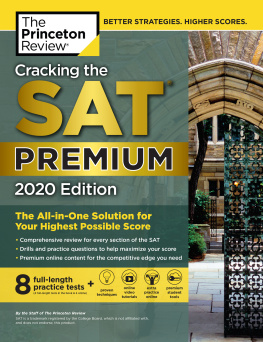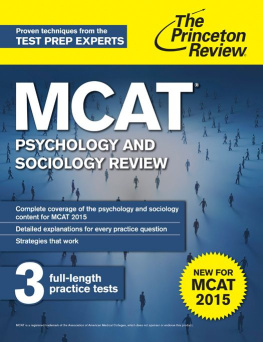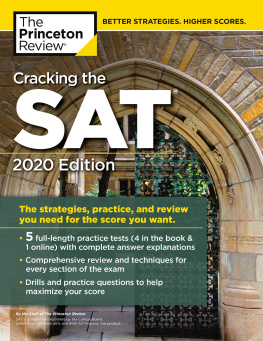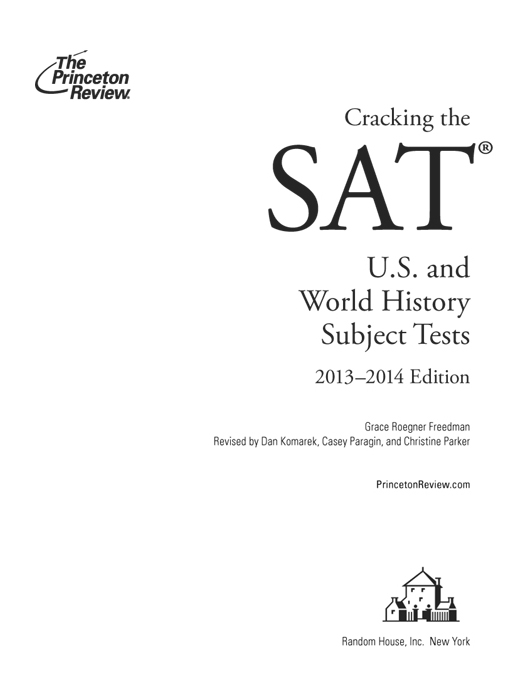
Editorial
Rob Franek, Senior VP, Publisher
Mary Beth Garrick, Director of Production
Selena Coppock, Senior Editor
Calvin Cato, Editor
Kristen OToole, Editor
Meave Shelton, Editor
Random House Publishing Team
Tom Russell, Publisher
Nicole Benhabib, Publishing Director
Ellen L. Reed, Production Manager
Alison Stoltzfus, Managing Editor
The Princeton Review, Inc.
111 Speen Street, Suite 550
Framingham, MA 01701
E-mail:
Copyright 2013 by TPR Education IP Holdings, LLC.
Cover art Jonathan Pozniak
All rights reserved. Published in the United States by Random House, Inc., New York, and in Canada by Random House of Canada Limited, Toronto.
The Metropolitan Museum of Art,
Gift of Heber R. Bishop, 1902 (02.18.309)
Image The Metropolitan Museum of Art
eBook ISBN: 978-0-307-94578-5
Trade Paperback ISBN: 978-0-307-94558-7
SAT is a registered trademark of the College Board, which does not sponsor or endorse this product.
The Princeton Review is not affiliated with Princeton University.
Editor: Meave Shelton
Production Editor: Lee Elder
Production Artist: Maurice Kessler
20132014 Edition
v3.1
Acknowledgments
This book would not have been possible without the help, advisement, proofreading, editing, creating, care, love, and support of Michael Freedman.
Additionally, I would like to thank my family, especially my mother, Judith Ruland, and my grandmother-in-law, Florence Freedman. I would particularly like to thank my original inspiration in the field of history, my high school history teacher, Ms. Desta Horner.
For the folks at The Princeton Review, my thanks loom large.
Thanks to Peter Hanink for his expert review of the material in this book, and to Tom Meltzer for lending his extensive knowledge of U.S. history to this project.
Special thanks to Adam Robinson, who conceived of and perfected the Joe Bloggs approach to standardized tests and many of the other successful techniques used by The Princeton Review.
The Princeton Review would also like to thank Cynthia Cowan for her work on the latest revision of this book.
Contents
Chapter 1
Orientation
The SAT Subject Tests are a series of one-hour exams developed and administered by Educational Testing Service (ETS) and the College Board. Unlike the SAT, the SAT Subject Tests are designed to measure specific knowledge in specific areas, such as biology, history, French, and math. They are scored separately on a 200800 scale.
How Are SAT Subject Tests Used by College Admissions?
Because the tests are given in specific areas, colleges use them as another piece of admissions information and, in some cases, to decide whether applicants can be exempted from college requirements. For example, a certain score may excuse you from a basic English class or a foreign language requirement.
Should I Take the SAT Subject Tests? How Many? When?
About one-third of the colleges that require SAT scores also require that you take two or three SAT Subject Tests. Your first order of business is to start reading those college catalogs and websites. College guidebooks, admissions offices, and guidance counselors should have the information you need to keep up with the changes.
As to which tests you should take, the answer is simple. Take the SAT Subject Tests:
on which you will do well
that may be required by the colleges to which you are applying
The best possible situation, of course, is when you can achieve both goals with the same subject test.
Some colleges have specific requirements; others do not. Again, start asking questions before you start taking tests. Once you find out which tests, if any, are required, determine which will show your particular strengths. Colleges that require specific tests generally suggest that you take two subject tests from the following five groups: laboratory science, history, foreign language, math, and English literature.
As for timing, take the tests as close as possible to the corresponding coursework you may be doing. For example, if you plan to take the SAT U.S. History Subject Test, and you are currently taking a U.S. history class, dont postpone the test until next year.
When Are the SAT Subject Tests Offered?
In general, you can take from one to three subject tests per test date in October, November, December, January, May, and June at test sites across the country. Not all subjects are offered at each administration, so check the dates carefully.
How Do I Register for the Tests?
To register by mail, pick up The Paper Registration Guide for the SAT and SAT Subject Tests at your guidance counselors office. You can also register at the College Board website at http://sat.collegeboard.org. This site contains other useful information such as the test dates and fees, as well as background information and sample questions for each subject test. If you have questions you can talk to a representative at the College Board by calling (866) 756-7346.
You may have your scores sent to you, to your school, and to four colleges of your choice. Additional reports will be sent to additional colleges foryou guessed itadditional money. Scores are made available to students via the College Boards website. To find out about the timeline of when scores are made available, please visit http://sat.collegeboard.org.
Whats a Good Score?
Thats hard to say, exactly. A good score is one that fits within the range of scores the college of your choice usually looks for or accepts. However, if your score falls below the normal score range for Podunk University, that doesnt necessarily mean you wont get in. Schools are often fairly flexible in what they are willing to look at as a good score for a certain student.
Along with your score, you will also receive a percentile rank. That number tells how well you scored in relation to other test takers. In other words, a percentile rank of 60 means that 40 percent of the test takers scored higher than you and 60 percent scored lower than you.
A Couple of Words About Score Choice
As of February 2009, you can choose which SAT Subject Test scores you want colleges to see. This is great news! For one thing, if you take more than one SAT Subject Test on a given test date, youll be able to choose which tests from that date youd like to submit to colleges. So if, for example, you take the French test followed by the chemistry test, but you dont think the chemistry test went very well, you can simply opt out of having that chemistry score sent to your schools.
The score reporting policy will be optional for students. This means that you arent required to opt in and actively choose which specific scores you would like sent to colleges. If you decide not to use the score-reporting feature, then all of the scores on file will automatically be sent when you request score reports. For more information about the score-reporting policy, go to the College Board website at www.collegeboard.org.



